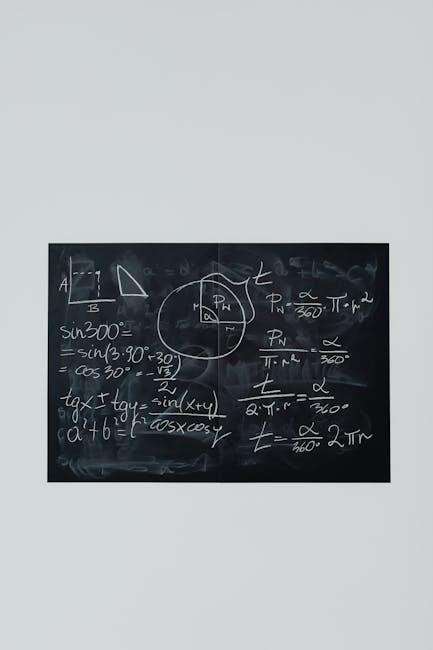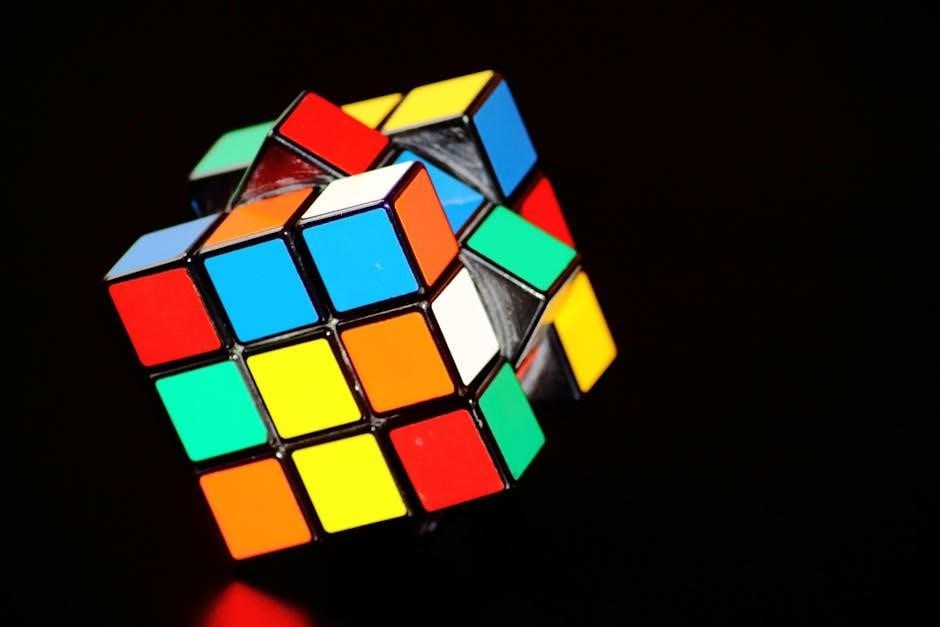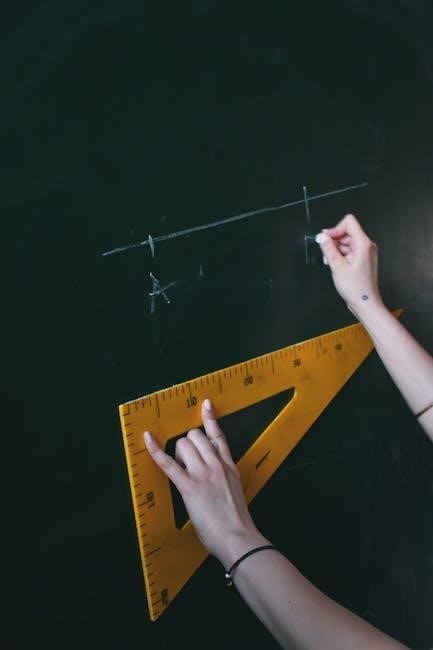
Definition and Types of Mathematical Puzzles
Mathematical puzzles are brain teasers that require logical reasoning and numerical skills. They include logic grids‚ number sequences‚ algebraic problems‚ and geometric challenges‚ each offering unique mental exercises and problem-solving opportunities.
What Are Mathematical Puzzles?
Mathematical puzzles are engaging brain teasers that combine logic‚ numeracy‚ and problem-solving skills. They present challenges in various forms‚ such as riddles‚ equations‚ or visual grids‚ requiring creative thinking and analytical approaches. These puzzles often appear in PDFs and books‚ offering both entertainment and educational value. They test one’s ability to interpret patterns‚ manipulate numbers‚ and apply mathematical principles in unconventional ways. Examples include Sudoku‚ logic grids‚ and algebraic riddles. Unlike traditional math problems‚ puzzles emphasize fun and intellectual stimulation‚ making them accessible to a wide audience. They encourage critical thinking and can enhance cognitive abilities while providing a sense of accomplishment upon solving. Mathematical puzzles are versatile and cater to different skill levels‚ from simple arithmetic games to complex equations‚ ensuring there’s something for everyone to enjoy and learn from.
Types of Mathematical Puzzles
Mathematical puzzles come in diverse forms‚ catering to various skill levels and interests. One popular type is logic grid puzzles‚ which require deductive reasoning to fill in grids based on clues. Number sequence puzzles challenge solvers to identify patterns and predict the next number in a series. Algebraic puzzles involve solving equations or decoding mathematical expressions‚ often with creative twists. Geometric puzzles focus on shapes‚ spatial reasoning‚ and visual logic‚ such as tangram puzzles or maze-solving. Additionally‚ cryptarithmetic puzzles replace numbers with letters‚ requiring both algebraic and linguistic skills. These puzzles are widely available in PDFs and books‚ offering a variety of challenges that enhance problem-solving abilities and mathematical fluency. Each type provides a unique way to engage with math‚ making them appealing to both casual enthusiasts and serious mathematicians. They foster critical thinking‚ creativity‚ and a deeper understanding of mathematical concepts.

History of Mathematical Puzzles
Mathematical puzzles have ancient roots‚ with examples from Egypt‚ Greece‚ and China. These early puzzles tested wisdom and mathematical understanding. Today‚ historical puzzles are accessible in PDFs for modern solvers.
Ancient Civilizations and Their Puzzles
Ancient civilizations laid the foundation for mathematical puzzles‚ blending logic‚ arithmetic‚ and storytelling. Egyptian papyri‚ like the Rhind Papyrus‚ featured geometric and algebraic problems. Greek philosophers posed riddles that tested reasoning and mathematical insight. Similarly‚ ancient China and India developed puzzles that combined numbers‚ patterns‚ and spatial reasoning. These early puzzles were often tied to cultural and religious practices‚ serving as tools for intellectual growth. Many of these historical puzzles are now available in PDF collections‚ offering modern solvers a glimpse into the evolution of mathematical thought. These ancient challenges not only entertained but also educated‚ fostering problem-solving skills that remain relevant today. By studying these puzzles‚ we gain insight into the mathematical ingenuity of our ancestors and their enduring influence on modern puzzle design.
Evolution of Puzzles Through the Ages
Mathematical puzzles have evolved significantly over centuries‚ reflecting advancements in mathematics and cultural influences. Ancient Egyptian and Babylonian civilizations introduced arithmetic and geometric problems‚ often inscribed on papyri and clay tablets. Greek philosophers popularized riddles and logic-based puzzles‚ while ancient Chinese and Indian mathematicians developed intricate number games and algebraic riddles. During the Middle Ages‚ Islamic scholars expanded puzzle design‚ incorporating algebra and combinatorics. The Renaissance period saw the rise of recreational mathematics‚ with puzzles becoming a staple of intellectual entertainment. By the 19th and 20th centuries‚ puzzles like Sudoku and logic grids gained global popularity. Today‚ mathematical puzzles are widely available in PDF formats‚ blending traditional concepts with modern problem-solving techniques. This evolution highlights humanity’s enduring fascination with mathematical challenges‚ transforming puzzles into a timeless art form that bridges cultures and eras.

Popular Mathematical Puzzle Formats
Popular formats include Sudoku‚ logic grids‚ number sequences‚ algebraic challenges‚ and geometric puzzles‚ each offering unique mental exercises in mathematical reasoning and problem-solving skills.
Logic Grid Puzzles
Logic grid puzzles are a popular format that challenges solvers to fill in grids based on numerical or logical clues. These puzzles‚ such as Sudoku and its variations‚ require careful reasoning and deduction. Players must use the given clues to eliminate possibilities and deduce the correct numbers or patterns. Logic grids enhance problem-solving skills‚ as they demand systematic thinking and attention to detail. The puzzles often start with partially filled grids‚ and the solver must complete them by following specific rules. These exercises are not only entertaining but also improve cognitive abilities like logical reasoning and analytical thinking. They are widely used in educational settings to teach logic and methodology. The structured nature of logic grid puzzles makes them accessible to learners of all ages‚ while their complexity can vary‚ catering to both beginners and advanced problem solvers. This format remains a cornerstone of mathematical puzzle enthusiasts’ collections.
Number Sequence Puzzles
Number sequence puzzles are engaging mathematical challenges that require identifying patterns or rules to complete a sequence of numbers. These puzzles often involve arithmetic‚ geometric‚ or other logical progressions‚ testing the solver’s ability to recognize relationships between numbers. They may include missing terms‚ requiring the solver to deduce the next or previous number based on the established pattern. Number sequence puzzles are popular in educational settings as they enhance logical reasoning‚ problem-solving‚ and critical thinking skills. They are also widely used in competitive exams and brain teasers to assess mathematical aptitude. Solvers can find these puzzles in various resources‚ including mathematical puzzle books and online platforms. By practicing number sequences‚ individuals can improve their analytical abilities and develop a stronger grasp of numerical relationships‚ making these puzzles both educational and entertaining for math enthusiasts of all ages.
Algebraic Puzzles
Algebraic puzzles are mathematical challenges that involve solving equations‚ manipulating variables‚ and applying algebraic principles. These puzzles often present equations with missing values or variables‚ requiring solvers to use algebraic techniques to find solutions. They can range from simple linear equations to complex systems involving multiple variables and higher-degree polynomials. Algebraic puzzles are excellent for developing problem-solving skills‚ logical reasoning‚ and the ability to think abstractly. Many mathematical puzzle books and online resources feature algebraic puzzles‚ catering to both beginners and advanced solvers. By solving these puzzles‚ individuals can strengthen their understanding of algebraic concepts and improve their analytical thinking. Additionally‚ algebraic puzzles often appear in competitive exams and brain teasers‚ making them a popular choice for those looking to challenge their mathematical abilities. They provide a fun and engaging way to practice and master algebraic principles.
Geometric Puzzles
Geometric puzzles challenge solvers to use spatial reasoning and geometric principles to solve problems involving shapes‚ areas‚ and volumes. These puzzles often require visualizing and manipulating geometric figures‚ such as triangles‚ circles‚ and polygons. Examples include arranging shapes to fit into a specific design‚ calculating areas with missing dimensions‚ or identifying properties of geometric figures. Geometric puzzles are highly engaging and improve visual-spatial skills‚ making them popular in math education and recreational activities. They are commonly found in mathematical puzzle books and online resources‚ offering a hands-on way to explore geometry concepts. Solving these puzzles enhances problem-solving abilities‚ logical thinking‚ and creativity. Geometric puzzles also appear in competitive exams and brain teasers‚ appealing to those who enjoy spatial challenges. They provide an interactive and fun method to learn and apply geometric principles in practical scenarios.

Benefits of Solving Mathematical Puzzles
Solving mathematical puzzles enhances problem-solving skills‚ logical thinking‚ and creativity. They improve cognitive abilities‚ boost confidence‚ and provide a fun way to develop math fluency and critical reasoning.
Cognitive Benefits
Solving mathematical puzzles significantly enhances cognitive functions such as memory‚ attention‚ and processing speed. These activities strengthen logical reasoning and spatial awareness‚ improving the brain’s ability to analyze complex patterns and relationships. By engaging in regular puzzle-solving‚ individuals can build mental agility and sharpen their problem-solving abilities‚ which are essential for everyday decision-making. Additionally‚ mathematical puzzles foster critical thinking and creativity‚ encouraging the brain to explore innovative solutions. Over time‚ these cognitive improvements can translate into better academic and professional performance‚ as well as enhanced overall mental sharpness. The repetitive practice of solving puzzles also boosts confidence and reduces cognitive fatigue‚ making it easier to tackle challenging tasks. Ultimately‚ mathematical puzzles serve as a powerful tool for intellectual growth and mental stimulation‚ benefiting individuals of all ages and skill levels.
Educational Benefits


Creating Your Own Mathematical Puzzles
Designing mathematical puzzles involves defining a clear concept‚ setting logical rules‚ and ensuring solvability. Start with simple problems‚ test them for clarity‚ and refine based on feedback to create engaging challenges.

Steps to Create a Puzzle
Creating a mathematical puzzle begins with defining a clear concept or objective. Start by identifying the target audience and the desired difficulty level. Next‚ outline the rules and constraints to ensure the puzzle is solvable and engaging. Use simple language to present the problem‚ avoiding ambiguity. Incorporate visual elements like grids or diagrams if necessary. Test the puzzle with a small group to gather feedback and refine it. Ensure the solution is logical and consistent with the rules provided. Finally‚ present the puzzle in a format that encourages participation‚ such as in a booklet‚ online platform‚ or interactive game. By following these steps‚ you can craft a puzzle that challenges and delights solvers of all skill levels.
Tips for Designing Engaging Puzzles
Designing engaging mathematical puzzles requires careful planning and creativity. Start by ensuring clarity in the problem statement and providing well-defined rules. Balance difficulty with solvability to avoid frustration. Incorporate visual elements‚ such as grids or diagrams‚ to enhance understanding. Make the puzzles relevant by connecting them to real-world scenarios or popular themes. Test the puzzle with a diverse group to identify and fix ambiguities. Offer optional hints to guide solvers without giving away the solution. Consider adding a competitive element or rewards to motivate participation. Use feedback from solvers to refine and improve the puzzle. Finally‚ ensure the solution is logical and satisfying‚ leaving solvers with a sense of accomplishment. By focusing on these elements‚ you can create puzzles that are both challenging and enjoyable for a wide audience.

Strategies for Solving Mathematical Puzzles
Effective strategies include breaking down problems‚ identifying patterns‚ and using logical reasoning. Practice problem-solving techniques‚ verify solutions step-by-step‚ and explore multiple approaches to build confidence and mastery.
General Problem-Solving Techniques
General problem-solving techniques are essential for tackling mathematical puzzles effectively. These include decomposition (breaking complex problems into simpler parts)‚ pattern recognition‚ and logical reasoning. Practicing systematic approaches‚ such as trial and error or reverse engineering‚ can enhance problem-solving skills. Verifying solutions step-by-step ensures accuracy and builds confidence. Additionally‚ understanding underlying mathematical principles and applying them appropriately is crucial. Utilizing visual aids‚ like diagrams or charts‚ can simplify abstract concepts. Staying patient and persistent is vital‚ as some puzzles require time and multiple attempts to solve. These techniques not only improve puzzle-solving abilities but also foster critical thinking and analytical skills. By mastering these strategies‚ individuals can approach a wide range of mathematical puzzles with greater ease and efficiency.
Specific Strategies for Different Puzzle Types
Different mathematical puzzle types require tailored strategies for successful solving. For logic grid puzzles‚ using elimination techniques and systematically checking possibilities is key. Number sequence puzzles often involve identifying patterns or arithmetic relationships‚ while algebraic puzzles may require setting up and manipulating equations. Geometric puzzles benefit from visual analysis and applying geometric theorems. Additionally‚ recognizing common structures‚ such as symmetry or repetition‚ can aid in solving various puzzles. Breaking down complex problems into manageable parts and verifying each step ensures accuracy. Understanding the unique characteristics of each puzzle type allows for more effective application of problem-solving techniques‚ enhancing both efficiency and enjoyment of the challenge.

Resources for Mathematical Puzzles
Mathematical puzzles can be found in various resources‚ including books‚ online platforms‚ and PDF guides. These tools offer diverse puzzles‚ fostering problem-solving skills and logical reasoning for learners at every level.
Recommended Books and PDFs
For those interested in exploring mathematical puzzles‚ several books and PDFs are highly recommended. Titles like “The Art of Mathematics” by Béla Bollobás offer a wide range of puzzles that challenge and entertain. “Mathematical Puzzles” by Peter Winkler is another excellent resource‚ featuring puzzles that require logical reasoning and creative thinking. Additionally‚ PDF guides such as “Introductory Algebra Puzzles” and “Geometry Brain Teasers” are available online‚ providing accessible and engaging content for learners of all levels. These resources are often available on academic websites‚ math forums‚ and platforms like ResearchGate or Google Scholar. They are invaluable for anyone looking to sharpen their problem-solving skills or simply enjoy the thrill of mathematical challenges. Many of these books and PDFs are designed to cater to both beginners and advanced solvers‚ ensuring a rewarding experience for everyone.
Online Platforms and Communities
Online platforms and communities are excellent resources for exploring mathematical puzzles. Websites like Project Euler and Math Stack Exchange offer a wide array of puzzles and discussions to engage with. Codeforces and Brilliant.org also provide interactive puzzles and competitions‚ catering to both beginners and advanced problem solvers. Additionally‚ forums like Reddit’s r/math and specialized Facebook groups are hubs for sharing and solving puzzles collaboratively. Many of these platforms feature problem archives‚ allowing users to practice at their own pace. They also often include discussion threads where participants can share strategies and learn from one another. These online communities foster a sense of camaraderie and competition‚ making the pursuit of mathematical puzzles more enjoyable and rewarding. Whether you’re looking for casual brain teasers or competitive challenges‚ these platforms are invaluable resources to explore.
Mathematical Puzzle Competitions
Mathematical puzzle competitions are engaging events that challenge participants to solve complex problems under time constraints. These competitions are popular among students and enthusiasts‚ fostering problem-solving skills and logical reasoning. Events like the USAMTS (USA Mathematical Talent Search) and International Mathematical Olympiad (IMO) are renowned for their challenging puzzles and mathematical depth. Competitions often include a variety of puzzle types‚ such as algebraic‚ geometric‚ and logic-based problems‚ catering to diverse skill levels. Many organizations and educational institutions host these events‚ offering prizes and recognition for top performers. Participating in mathematical puzzle competitions not only enhances analytical thinking but also builds confidence and encourages collaboration. They serve as a platform for like-minded individuals to engage in intellectual challenges‚ making math accessible and enjoyable for all. These competitions are a great way to test problem-solving abilities and connect with a global community of math enthusiasts.
Mathematical puzzles are a fascinating and rewarding way to engage with mathematics‚ offering challenges that stimulate both the mind and imagination. From logic grids to algebraic brain teasers‚ these puzzles provide a platform to sharpen problem-solving skills‚ enhance cognitive abilities‚ and foster a deeper appreciation for mathematical concepts. Whether solved individually or through competitions like the USAMTS or IMO‚ mathematical puzzles encourage creativity and critical thinking. Resources such as PDF guides‚ online platforms‚ and educational books make these puzzles accessible to learners of all ages and skill levels. Solving mathematical puzzles not only builds confidence but also turns math into an enjoyable and interactive experience. For those seeking intellectual challenges‚ mathematical puzzles are a timeless and enriching activity that continues to inspire exploration and mastery.
